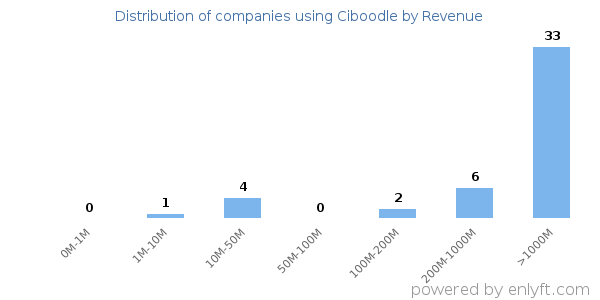Companies using Ciboodle
We have data on 36 companies that use Ciboodle. The companies using Ciboodle are most often found in United States and in the Information Technology and Services industry. Ciboodle is most often used by companies with >10000 employees and >1000M dollars in revenue. Our data for Ciboodle usage goes back as far as 7 years and 8 months.
If you’re interested in the companies that use Ciboodle, you may want to check out Salesforce.com CRM and Zoho CRM as well.
Who uses Ciboodle?
| Company | HP Development Company, L.P. |
| Website | hp.com |
| Country | United States |
| Revenue | >1000M |
| Company Size | >10000 |
| Company | Wipro Ltd |
| Website | wipro.com |
| Country | India |
| Revenue | >1000M |
| Company Size | >10000 |
| Company | Nihilent |
| Website | nihilent.com |
| Country | India |
| Revenue | 200M-1000M |
| Company Size | 1000-5000 |
| Company | Tech Mahindra Ltd |
| Website | techmahindra.com |
| Country | India |
| Revenue | >1000M |
| Company Size | >10000 |
| Company | UnitedHealth Group Inc |
| Website | unitedhealthgroup.com |
| Country | United States |
| Revenue | >1000M |
| Company Size | >10000 |
| Company | Website | Country | Revenue | Company Size |
|---|---|---|---|---|
| HP Development Company, L.P. | hp.com | United States | >1000M | >10000 |
| Wipro Ltd | wipro.com | India | >1000M | >10000 |
| Nihilent | nihilent.com | India | 200M-1000M | 1000-5000 |
| Tech Mahindra Ltd | techmahindra.com | India | >1000M | >10000 |
| UnitedHealth Group Inc | unitedhealthgroup.com | United States | >1000M | >10000 |
Target Ciboodle customers to accomplish your sales and marketing goals.
Ciboodle Market Share and Competitors in Customer Relationship Management (CRM)
We use the best indexing techniques combined with advanced data science to monitor the market share of over 15,000 technology products, including Customer Relationship Management (CRM). By scanning billions of public documents, we are able to collect deep insights on every company, with over 100 data fields per company at an average. In the Customer Relationship Management (CRM) category, Ciboodle has a market share of about 0.1%. Other major and competing products in this category include:
Customer Relationship Management (CRM)
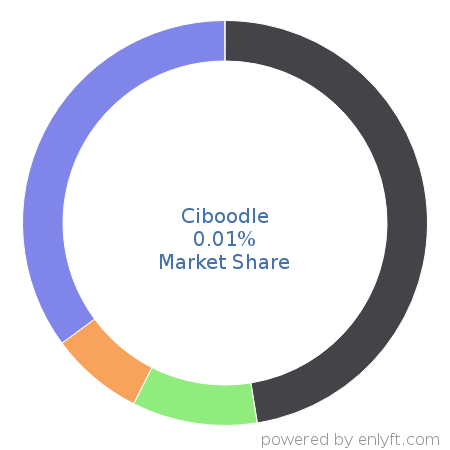

What is Ciboodle?
Ciboodle is customer interaction software that manages the front office customer service and sales interactions. The Ciboodle platform is organized into product modules so as to accelerate organization's ability to deliver consistent customer service no matter which channel is chosen by the customer.
Top Industries that use Ciboodle
Looking at Ciboodle customers by industry, we find that Information Technology and Services (14%), Financial Services (8%), Hospital & Health Care (6%), Telecommunications (6%) and Utilities (6%) are the largest segments.
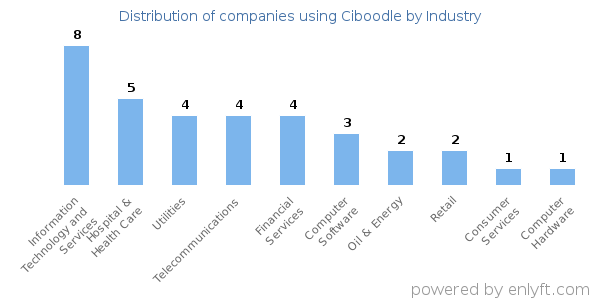
Top Countries that use Ciboodle
34% of Ciboodle customers are in United States, 11% are in United Kingdom, 9% are in South Africa, 6% are in Australia and 6% are in India.
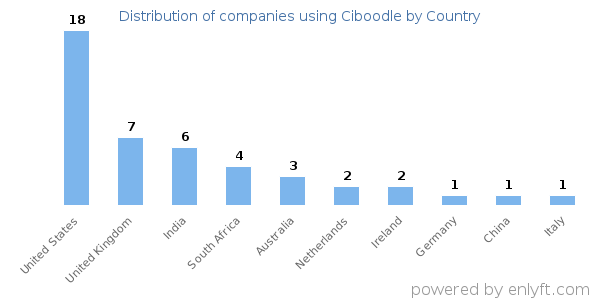
Distribution of companies that use Ciboodle based on company size (Employees)
Of all the customers that are using Ciboodle, a majority (65%) are large (>1000 employees), 0% are small (<50 employees) and 18% are medium-sized.
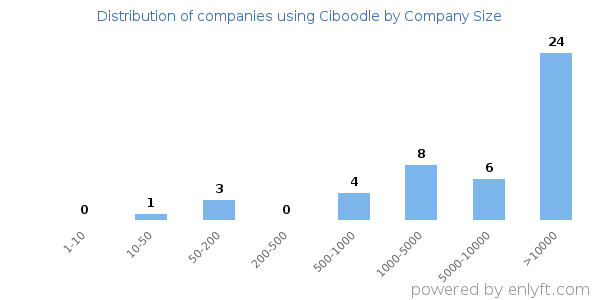
Distribution of companies that use Ciboodle based on company size (Revenue)
Of all the customers that are using Ciboodle, a majority (74%) are large (>$1000M), 9% are small (<$50M) and 0% are medium-sized.
